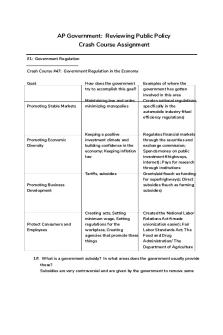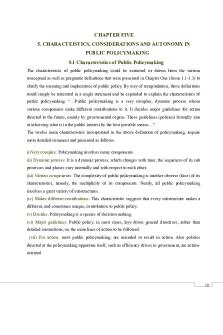Agreements Against Public Policy PDF

| Title | Agreements Against Public Policy |
|---|---|
| Author | Neha Kesarwani |
| Course | Business Law |
| Institution | University of Mumbai |
| Pages | 6 |
| File Size | 130.4 KB |
| File Type | |
| Total Downloads | 99 |
| Total Views | 173 |
Summary
Lecture Notes given by Professor Ravnish at Sanpada...
Description
AGREEMENTS AGAINST PUBLIC POLICY The following agreements have been held by courts of law to be against public policy, and so void. 1. Trading with the enemy. An Indian national cannot trade with an alien enemy without a license from the. Government. An agreement with an alien enemy is illegal, void and inoperative.
2. Agreement interfering with, the course of justice. An agreement for stifling prosecution is unlawful and void. When an offence has been committed by a person; he must be prosecuted. Any agreement which seeks to prevent the prosecution of such a person is opposed to public policy and is unlawful. Similarly, an agreement to vary the statutory period of limitation is void. Also, an agreement for the purpose of using improper influence of any kind with judges or officers of justice are void.
3. Agreements for sale of public offices and titles. Transfer of public offices and titles is against public policy and invalid. Agreement to transfer office from one person to another or to secure an office of honour or title for monetary consideration is totally bad and unlawful.
4. Agreements tending to create monopolies. These are void as opposed to public policy.Also, agreements not to bid at an auction sale will be unlawful if made with the object of defrauding a third party.
5. Agreements creating an interest opposed to duty are void. For example, an agreement by an agent whereby he would be enabled to make secret profits is void. An agreement by a newspaper proprietor not to comment on the conduct of a particular person is void as opposed to public policy.
6. Agreements restraining personal freedom. An agreement which unduly restrains personal liberty is void, as against public policy. An agreement by a debtor to do manual work for the creditor so long as the debt is not paid is full is void.
7. Agreement restraining parental rights. According to law, the father is the natural guardian of his minor child and in the absence of the father, the mother is the guardian. This right cannot be deprived away by any agreement. An agreed to transfer guardianship of his two minor sons to B and agreed not to revoke this transfer. But later, he changed his mind and wanted his sons back. It was held by the Court that he could get back his sons as the agreement was void as being against public policy. Similarly, an agreement to receive money for giving a daughter in marriage is void.
8. Agreement interfering with marital duties. An agreement which interferes with the performance of marital duties is void as being against public policy. Thus, an agreement to lend money to a woman in consideration of her getting a divorce and marrying the
money lender is void. 9. Marriage brokerage or marriage brokerage agreement. An agreement to procure marriage for reward is void as being opposed to public policy. An agreement to pay money to parents or guardian in consideration of his giving his daughter in marriage is void. The entire position regarding unlawful agreement may be summed up as: An agreement will be unlawful and so void if it is illegal or immoral or is opposed to public policy.
Void Agreement:An agreement may be void for the following reasons, namely: 1. there being no lawful consideration; 2. contracts by minor or a person of unsound mind; 3. contracts made under a mistake of fact on the part of both parties; and 4. agreements of which the consideration or objects are unlawful. In addition to these four cases, the Contract Act expressly declares certain types of agreements to be void vide Section 26 to 30. Such contracts are : 1. Agreements in restraint of marriage. The law regards marriage and the married status as the ordinary right of every individual, and therefore, every agreement in restraint of marriage of an adult person is void. Thus, no restriction or limitation on a person’s right to marry any person is valid (S. 26). 2. Agreement in restraint of trade. Every man is at liberty to work for himself and carry on any lawful business, trade or profession and is not at liberty to deprive himself of this right. Accordingly, Section 27
of the Act lays down that an agreement by which anyone is restrained from exercising a lawful profession, trade or business of any kind is void. In English law, however, contracts which impose reasonable restraints are valid. But in India, all agreements in restraint of trade, whether general or partial, qualified or unqualified, are void. Therefore, an agreement between an employee and his employer that the letter shall not carry on any similar business after the terms of employment is over is void. Cases in which restraint of trade is valid in India. There are certain statutory exceptions to the above rule of Section 27. An agreement of trade is valid in the following cases: (a) Sale of Goodwill. A seller of a goodwill of a business may agree with the buyer to refrain from carrying on a similar business, within specified limits as to territory and time so long as the buyer .carries on a like business, and the restraint is reasonable. (b) A partner of a firm may be restrained from carrying on a similar business, so long as he remains a partner. [S. 11(2) of the Indian Partnership Act.] (c) Section 36(2) of the same Act provides that a partner may agree with the other partners that on ceasing to be a partner he will not carry 0on any business similar to that of the firm within specified local limits and time; and the agreement shall be valid if the restrictions are reasonable. (d) Section 54 of the same Act provides that partners may, upon or in anticipation of the dissolution of the firm, agree that all or some of .them shall not carry on similar business within a specified period within specified local limits. Similarly, negative stipulations in service contracts are not considered to be in restraint of trade and are, therefore, valid. Thus, a doqtor employed in a hospital may be debarred from private practice.
3. Agreement in restraint of legal proceedings. A person cannot by agreement alter his personal law or the statutory law. Thus an agreement which prohibits a person from taking judicial proceedings in respect of any right arising from a contract, is void. But arbitration is valid. 4. Uncertain agreements. Agreements, the meaning of which is not certain, or capable of being made certain, are void [S 29]. For example, where A agrees to sell to B, “a hundred tons oil,” the agreements is void for uncertainty, for there is nothing to show what kind of oil was intended. 5. Agreements by way of wagers. Agreements, by way of wager are void. A wager is an agreement by which money is payable by one person to another on the happening or non-happening of a future uncertain event. The essence of gambling and wagering is that one party is to win and the other to lose upon a future event, which at the time of the contract is of an uncertain nature that is to say, if the event turns out one way. A will lose but if turns out the other way he will win. For example, A agrees with B that if it rains on a certain day A will pay Rs.50. This is a Wagering agreement and void. Commercial transaction and wagers. A commercial transaction may be valid or a wager according to the intention of the parties. A share of commodity transaction in which there is no intention to give or take delivery of the shares or the commodity and the parties intend to deal only with the differences in prices is a wagering transaction. But where there is a clear intention to give and take delivery it is not a wager but a valid contract. Lotteries. A lottery is a game of chance. Therefore, an agreement to buy a lottery ticket is a wagering agreement. But where law has specially made lottery legal transaction it is valid.
Crossword Competitions. A crossword puzzle, in which prizes depend upon correspondence of the competitors’ solution with a previously prepared solution kept with the editor of a newspaper, is a lottery and, therefore, a wagering transaction. But, if for a successful solution a good measure of skill is required, it is not a wager; e.g., picture puzzles, athletic competition. Contracts of insurances are not wagering agreements. Effect of wagering agreements. An agreement by way of wager is void. It will not be enforced by the Courts of law. But, in Bombay Presidency, wagering agreements are, by a local Statute, not only void but also illegal. The consequence of this difference is that in Bombay, collateral agreements to wagering agreements are also void; while in the rest of India only the wagering agreements are void and transactions collateral to such agreements are not void. Thus, in Bombay, money lent to pay a gambling debt cannot be recovered by the lender, but in the rest of India it can be recovered. 6. Impossible Act. According to Section 56(1) an agreement to do an act impossible in itself is void. For example, where A agrees with B, to discover treasure by magic, the agreement is void....
Similar Free PDFs

Agreements Against Public Policy
- 6 Pages

Public Policy Essay
- 3 Pages

Public Policy Analysis paper
- 15 Pages

Public Policy Assignment
- 4 Pages

Public Policy - Elarba Badih
- 3 Pages

Reading Article - Public Policy
- 2 Pages

Public Policy final study guide
- 7 Pages

Marxist theory of Public Policy
- 8 Pages

Public Policy Decision Making Models
- 18 Pages

Interest Groups and public policy
- 10 Pages

Official Actors IN Public Policy
- 14 Pages
Popular Institutions
- Tinajero National High School - Annex
- Politeknik Caltex Riau
- Yokohama City University
- SGT University
- University of Al-Qadisiyah
- Divine Word College of Vigan
- Techniek College Rotterdam
- Universidade de Santiago
- Universiti Teknologi MARA Cawangan Johor Kampus Pasir Gudang
- Poltekkes Kemenkes Yogyakarta
- Baguio City National High School
- Colegio san marcos
- preparatoria uno
- Centro de Bachillerato Tecnológico Industrial y de Servicios No. 107
- Dalian Maritime University
- Quang Trung Secondary School
- Colegio Tecnológico en Informática
- Corporación Regional de Educación Superior
- Grupo CEDVA
- Dar Al Uloom University
- Centro de Estudios Preuniversitarios de la Universidad Nacional de Ingeniería
- 上智大学
- Aakash International School, Nuna Majara
- San Felipe Neri Catholic School
- Kang Chiao International School - New Taipei City
- Misamis Occidental National High School
- Institución Educativa Escuela Normal Juan Ladrilleros
- Kolehiyo ng Pantukan
- Batanes State College
- Instituto Continental
- Sekolah Menengah Kejuruan Kesehatan Kaltara (Tarakan)
- Colegio de La Inmaculada Concepcion - Cebu




